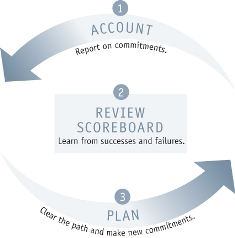How do you measure accountability?
In a recent weekly meeting with one of my clients, the president observed that possibly the reason for not getting external accountability is the company is not demanding the right level of accountability internally. It was an astute observation. He made the observation after we went through their accountabilities.  A number of comments suggested those responsible had either not thought through when they could complete their responsibility or were not taking their deadlines seriously.
A number of comments suggested those responsible had either not thought through when they could complete their responsibility or were not taking their deadlines seriously.
In the midst of their busiest season, it’s easy to brush off deadlines due to everyone being overextended. Instead the President chose to make it an example why externally they were not getting commitments they needed. When a task can’t be completed within a certain time frame, the deadline should reflect this when entered into the accountability worksheet. The comment made everyone rethink their commitments and recognize the need for standards in order to achieve results.
They’ve struggled specifically in the past with determining their sales cycle. The president suggested that by not taking internal responsibilities seriously, is it possible when working with clients and prospects they communicate the same message? By requiring hard deadlines and consequences for not getting the activity done in the time line specified, they raise their internal standards. Wouldn’t that also improve their expectations and accountability with their clients and prospects?
The president is suggesting by having high internal standards, they raise the bar on what they expect from customers and prospects. It’s the concept of “a rising tide lifts all boats.” The higher standard of expectations escalates everyone.
When we expect more from ourselves, it’s only natural we expect more from others. Agreed?
When people are accountable to meet deadlines momentum is generated. Momentum carries with it a level of energy that propels the company forward. In fact in many cases it’s difficult to get out of the way of momentum. Getting things done leads to getting more done, and those around you are swept up by the power of your completions.
Need help with accountability? Contact Us for our simple accountability chart (Excel). At each weekly meeting we review and track the leadership team’s progress with their projects and assignments.
For more help on accountability check our 43 blogs on the subject. Trouble keeping others accountable? You may wish to read how group meetings provide a significant impact on increasing accountability. You may also wish to learn more about the Rockefeller Habits ideas for building accountability at the Mastering the Rockefeller Habits Four Decision Workshop in Cedar Rapids on November 12th.
Face the Brutal Facts! It’s an admonition from Jim Collins Good to Great. Yesterday at my clinic Dr. Silverman answered some questions about my condition. It’s critical when making business decisions that we are willing and open to facing the brutal facts of our current situation. Next blog we’ll discuss discovering my brutal facts and how and why you should be collecting yours.






.jpeg?width=150&height=135&name=Hand%20with%20marker%20writing%20the%20question%20Whats%20Next_%20(1).jpeg)

